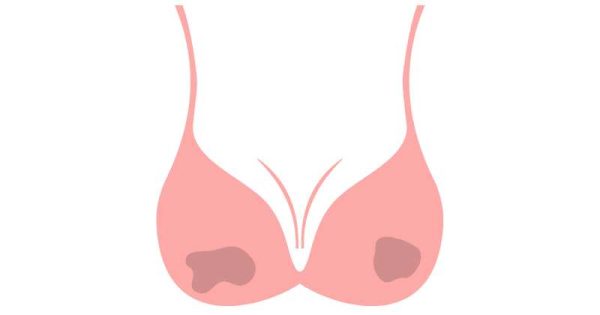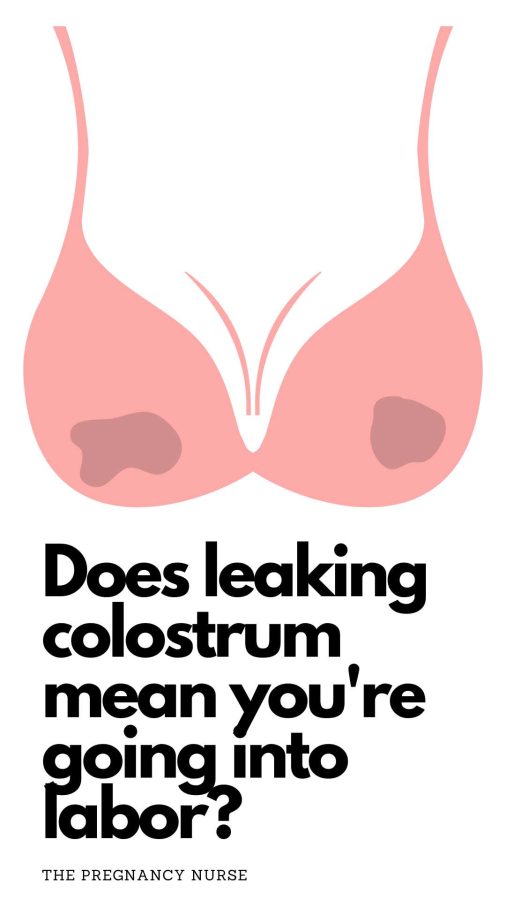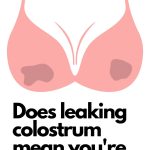👋 I’m so glad YOU are here. Are you looking to also get your partner prepared? This is for BOTH of you. Couples just love it and I know you want to both feel prepared!
With all the changes with your body during pregnancy some colostrum leaking can make you wonder what it’s for. Today we’re going to talk about what it means and if labor is coming soon!

Before we get started, let me introduce myself — I’m Hilary, The Pregnancy Nurse®. I’ve been a nurse since 1997 and I have 20 years of labor and delivery experience. I get asked this question a lot because leaking colostrum isn’t something that a lot of people expect to find. I know it was always a bit of a surprise for me!
In fact, we talk a little bit about colostrum in my Online Prenatal Class for Couples Bonus Video: Breastfeeding Basics with The Breastfeeding Mama. If you’re interested in pregnancy, labor, AND breastfeeding — we’ve got it ALL for you in there!
Ok, let’s get back to the question at hand:
Does leaking colostrum mean labor is close?
Leaking colostrum during pregnancy is a common occurrence and happens to many women. However, it may not necessarily mean that labor is close.
Colostrum, the yellowish substance that is produced during the later stages of pregnancy, is the body’s way of preparing for breastfeeding. Therefore, leaking colostrum means your body is getting ready to feed your baby. Leaking colostrum isn’t unusual during pregnancy, but it is not a reliable indication of when labor will begin.
Is it Normal To Leak Colostrum During Pregnancy?
It is completely normal to leak colostrum during pregnancy, which is a thin, yellowish fluid that is produced by the mammary glands in preparation for lactation. This typically occurs during the 3rd trimester but can happen at any point during pregnancy.
Some women may not experience any leakage while others may have it as a continuous occurrence. However, if the leakage becomes excessive or is accompanied by pain or inflammation, it is important to seek medical advice. Colostrum during pregnancy is a natural part of the body’s preparations for breastfeeding and should not be a cause for concern.
Why are your breasts leaking during pregnancy?
During pregnancy, it is common for women to experience breast changes, including breast tenderness and enlargement. Additionally, many women may leak breast milk, or colostrum, from their breasts. For me, this just showed up as a milky-dried substance on my breasts that I’d notice when I undressed or showered, and maybe some yellow-ness in my bra.
This is a normal occurrence, as the hormone prolactin, responsible for milk production, increases during pregnancy. As a result, the breasts are stimulated to produce and store milk for when the baby is born. The colostrum, or ‘pre-milk’ sometimes can leak during pregnancy as the body prepares for lactation. Breasts may begin leaking before birth, or after. Typically breasts may begin leaking in the third trimester or closer to delivery.
This process not always specific to labor as well, because some women’s breasts can leak the entire pregnancy. Leaking breasts during pregnancy is usually normal and nothing to be concerned about. However, if there is significant discharge or pain, it is important to consult a healthcare provider.
Although, if you are leaking it might be time to pack your hospital bag:
How can you tell if you have colostrum?
Colostrum is the very first milk produced by a woman’s breasts during pregnancy. It is thicker and more concentrated than regular breast milk, and it is yellow or orange in color. Some women may notice that they leak colostrum from their breasts during pregnancy, which is completely normal and nothing to worry about.
If you are wondering if you have colostrum, you can check your bra for any yellow or orange stains. You may also notice that your nipples feel more sensitive or tender, which can be a sign that your body is producing colostrum. Keep in mind that not all women will experience leaking or other symptoms of colostrum, and this is perfectly fine. If you are concerned about your breast milk production or have any other questions, be sure to talk to your healthcare provider for guidance.
You can also get a prenatal breastfeeding consult with someone like The Breastfeeding Mama! You can book with her here.
What can you do about colostrum and leaking breast milk during pregnancy?
Heads up! 👀 There may be affiliate links in here – I might earn a smidge with your click. No cost to you, just good vibes! Check my boring stuff for deets.
It is common for pregnant women to experience leaking breast milk during pregnancy, especially in the third trimester. This is due to the production of colostrum, a thick and yellowish fluid that helps nourish the baby in the first few days after birth. While leak colostrum during pregnancy is usually not a cause for concern, it can be a bit uncomfortable and embarrassing.
Fortunately, there are ways to manage the situation. Wearing a bra that is supportive and properly fitting can help to reduce the amount of leaky milk. Additionally, using nursing pads can help to absorb and contain the milk, preventing embarrassing stains. It may also be helpful to avoid stimulating the breast unnecessarily, such as by avoiding shower water hitting the breast directly. If the leaking continues to be a persistent issue, it is important to speak with a doctor or lactation consultant, who can provide further guidance and assistance.

Is it okay if I don’t leak colostrum?
It is perfectly fine if you do not leak colostrum during your pregnancy. Some women may start leaking colostrum during their third trimester, while others may not leak at all. This does not reflect on your ability to breastfeed once your baby is born. Leaking colostrum is not necessarily an indication of a healthy pregnancy or early labor either.
In my class with The Breastfeeding Mama she mentioned that often women leak more on their first baby, and less on subsequent pregnancies which was interesting to me.
Is pumping colostrum before birth safe?
Most people don’t really pump it, but some do collect it. However, some do try to pump.
However, there are some potential risks to consider. Pumping can sometimes stimulate contractions, which could potentially lead to preterm labor in mothers who are at risk, so you definitely don’t want to do it until you are past 37 weeks of pregnancy.
From what I have seen most women don’t pump it using a breast bump — they more collect it using something like a Hakka. Or they hand express it and save drops of colostrum to feed baby via a spoon (a great article on hand expression is here). Some people will also save it in syringes. However, that is a lot of work (as it should also be kept cold until baby is read to eat it) — so if you just want to wear a breast pad there’s no shame in that.
Does leaking colostrum early mean good milk supply?
Leaking colostrum early on in pregnancy does not necessarily indicate a good milk supply once the baby is born, or that you will produce milk well.
While it is normal for some women to leak colostrum in the later stages of pregnancy, it is not an indicator of their milk supply capacity. Some mothers may have a strong milk supply, while others may struggle to make enough milk for their newborns. While leaking colostrum may be a sign that the breasts are preparing for nursing, it is not a reliable indicator of the milk supply potential.
Personally, I do not have a good supply and I do leak colostrum, so I can testify that the two are not linked.
Will pumping colostrum before birth increase my milk supply?
There doesn’t seem to be any evidence that pumping before birth increases supply. It can also cause contractions (and not always labor contractions) so most people don’t recommended it to increase supply.
Why colostrum is important?
Colostrum is the essential first milk produced by a mother’s breast after the birth of her baby. It is unique in composition and contains high amounts of antibodies, immune cells, and growth factors which are not present in mature breast milk. Colostrum is essential for the newborn baby as it provides critical nutrients, builds immunity, and safeguards them against infections and diseases. It also helps in the development of a healthy digestive system and protects against allergies and other health conditions.
Colostrum is produced in the initial few days after delivery until the mother produces mature breast milk (some people term that as “your milk comes in”). The nutrients and antibodies present in colostrum are incredibly crucial for the baby’s proper growth and development. Therefore, breastfeeding the baby within the first hour of birth is vital as it allows the baby to receive a rich supply of colostrum. Colostrum is undeniably important for the baby’s health and can lead to long-term health benefits that are crucial for their development.
I actually also have a post all about if you can breastfeed you husband during pregnancy in case you’re curious.
Difference Between Colostrum and “Breast Milk”
While both of them feed babies well, Colostrum is more yellow-y, and breast milk is more white. Colostrum is thicker and contains lots of antibodies that are important for newborns to have. It will be what you initially have to feed baby. Then around day 3-5 your “milk will come in” and it will change to the white substance that looks more like milk — they call this “mature milk”. For those first days before your milk comes in colostrum is normally enough for your baby as their stomach is very small (because they’ve never eaten before).
So, what ARE the Signs of Labor?
In general with labor you’ll see:
- Contractions growing in frequency, intensity and duration
- You may have some involvement with your stomach (nausea, diarrhea)
- Changes in discharge
I talk a lot about how to know if you’re going into labor in The Online Prenatal Class for Couples, so be sure to join me in there to really understand it. AND grab the Bump to Bassinet bundle to get my Breastfeeding Basics bonus video included!
And, if you’re not quite sure you’re ready for that whole thing, check out my free prenatal class. It’s your first step toward getting in the driver’s seat of your birth.
Don’t miss my super helpful post all about the signs of labor. Great info for pregnancy!







 When Should I Start Using a Birthing Ball?
When Should I Start Using a Birthing Ball?
